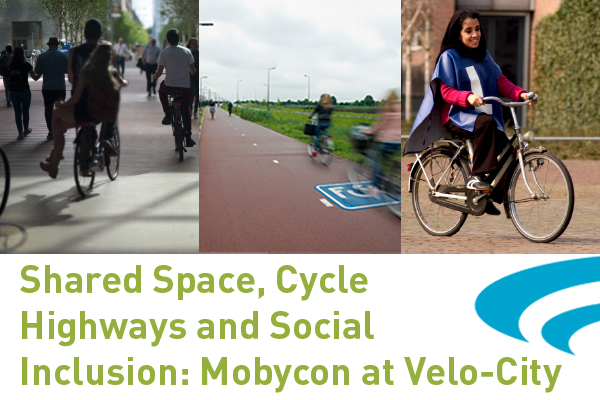Cycle culture / Innovation / Mobility / Public Spaces / Shared space / The Netherlands
Mobycon heads to Dublin for Velo-City 2019
The 39th Annual Velo-City Conference launches Tuesday, 25 June in Dublin Ireland marking four exciting, packed days of presentations, workshops, tours and connections between professionals and advocates working together to make cycling accessible to everyone, everywhere. Mobycon has proudly attended Velo-City for many years, sharing our vision for making the world less dependent on cars and our work creating cities for people, and this year is no different. Consultants and Advisors Angela van der Kloof, Lennart Nout, Babet Hendriks and Bernhard Ensink are excited to share their research, personal journeys and build new relationships with colleagues around the globe. Be sure to stop by our booth at the Dutch Cycling Embassy Pavilion and visit our sessions listed below!

Angela van der Kloof

Seeing the Street from a Child’s Perspective
Session 1C: Dutch Cycling: When One in Four is Not Enough
Tuesday, 25 June; 10:45-11:45
Inspired by her contribution to the recently published book from STIPO, The City at Eye Level for Kids, Angela shares her personal experience raising two children on bicycles, and how that experience helps inform her daily work to create policies that consider all road users. This PechaKucha style presentation will give a quick glimpse into how our streets are experienced by our youngest, and why it’s important to value that perspective when building cycling-friendly cities.
Cycling and Transport Poverty in the Dutch Context
Session 3D: Scientists for Cycling: Global Transport Justice
Tuesday, 25 June; 2:15-3:15
Cycling can play an important role in reducing transport poverty, especially in the Netherlands where cycling mode shares are high, bicycle facilities are numerous, and cycling is a mainstream mode of transportation. Yet, there is little attention for the bicycle in the research on transport poverty. At the same time, there is little attention for transport poverty amongst researchers, professionals and advocates in the cycling field.
In this presentation Angela will focus on the relationship between transport poverty and bicycling, by looking for answers to questions like ‘Which mechanisms are at play when cycling helps to ease transport poverty? And which groups in the Netherlands can we identify, that suffer from cycling poverty? What is being done to overcome this? And what can we learn from that?’
Lennart Nout

Cycling through pedestrian zones, safety risk or economic opportunity. Lessons from The Netherlands
Session 7B: Planning the Urban Realm
Wednesday, 26 June; 2:15-3:15
Cycling through pedestrianised shopping streets is a contentious issue in many cities around the world, even in cycle-friendly Netherlands. While some cities rely on self-governance of cyclists by allowing them to ride (slowly) through the pedestrian areas, others choose to ban cyclists from their shopping streets all together. Crashes between pedestrians and cyclists are very rare, but a feeling of lack of safety is common in these type of streets. National guidance on this issue has however been sparse and is considered cyclist-focused and too generic to fit every type of situation. Allowing or disallowing cyclists can have severe impacts on economic vitality of retail streets, especially in areas where local retailers are already struggling with competing large format retail.
Mobycon has recently completed two separate studies into the behaviour of cyclists in pedestrian zones and the role they play in keeping the street economically viable. Based on literature review, a survey, street design review, public engagement events and a network analysis, a phased approach was recommended to reassess the role of the street in the cycling network and the potential impact on local retail. Based on the results of this study, general recommendations for how to deal with cyclists in a pedestrian zone, what type of infrastructure is to be avoided and how you can ensure access to local retail for all while avoiding a feeling of an unsafe environment for leisure shoppers. International comparisons are included with concrete recommendations for cities around the world.
Babet Hendriks

Are cycle highways competing or completing with other transport modes? Experiences from the CHIPS project
Session 8A: Good Companions: Combining Cycling with Public Transport
Thursday, 27 June; 10:30-11:30
A new mobility product has arisen the past years: the cycle highway. In CHIPS it is defined as the backbone of cycle infrastructure. However, there is a realization that the cycle highway should be planned and placed in a bigger picture. A solid connection with other transport modes increases the cycle highway’s impact. Therefore, the province of Gelderland has been researching the connection between cycle highways and other transport modes in the CHIPS project.
While developing the models on the connection between cycle highways and other transport modes one central question reoccurred: are cycling highways competing or completing other transport modes? The CHIPS team’s experiences teach us that they can do both. This goes for both the planning process and usage by end users. Babet’s presentation will illustrate this debate through sharing their results in the different pilots and experience from partners in the CHIPS project.

